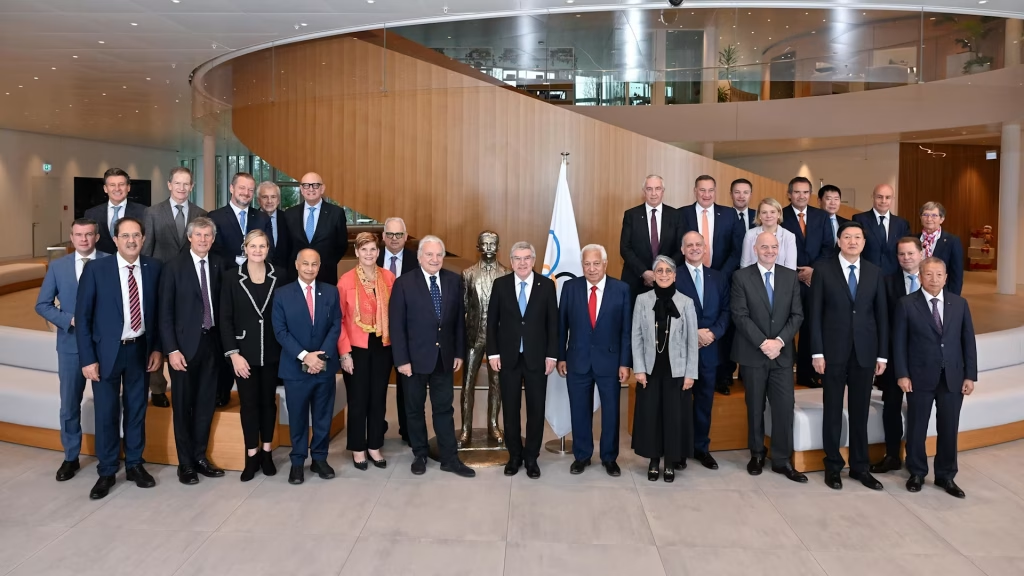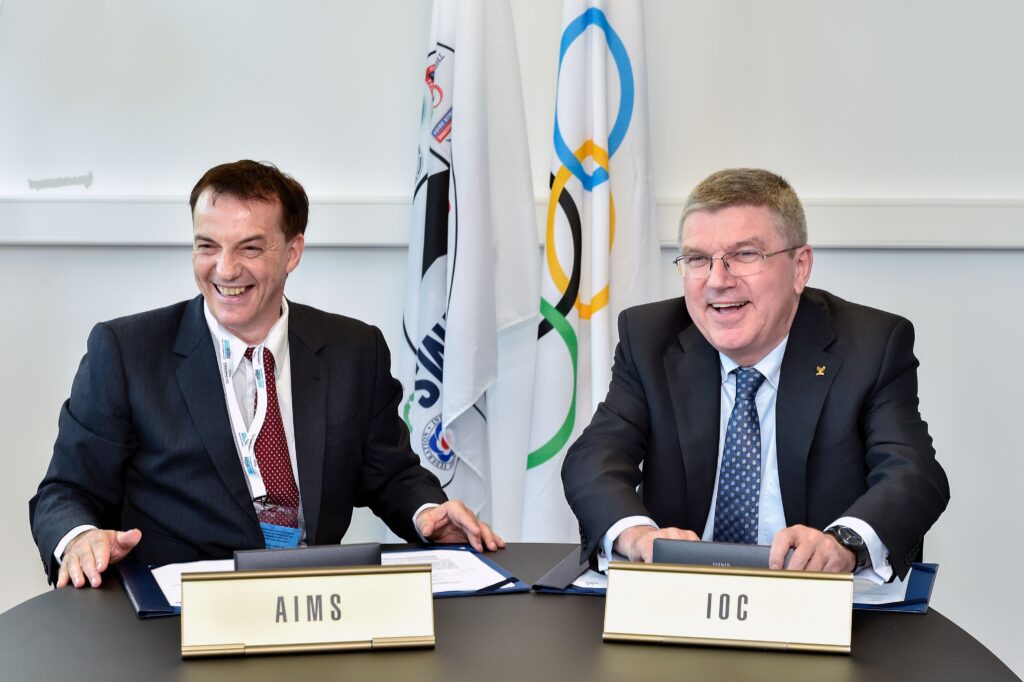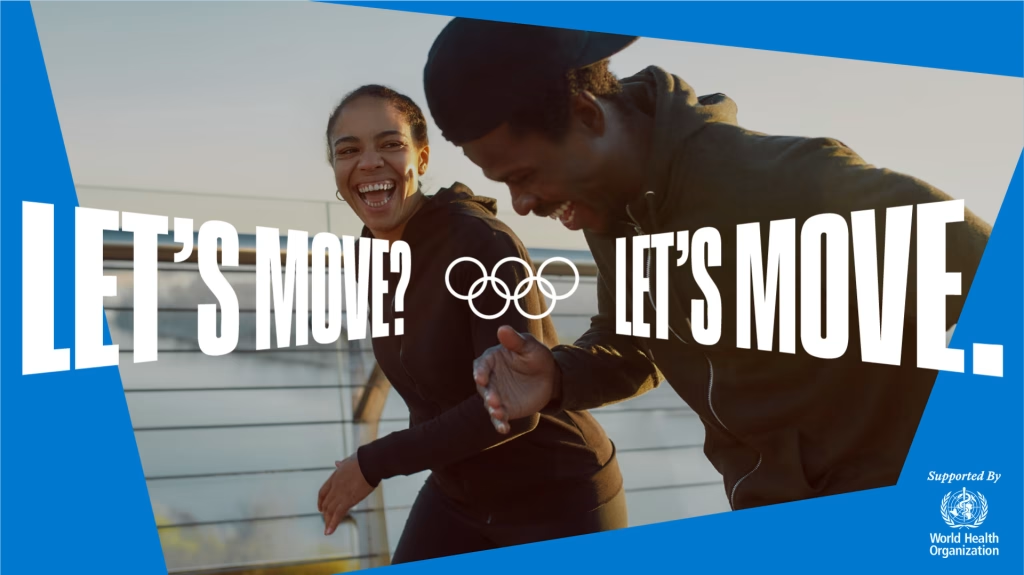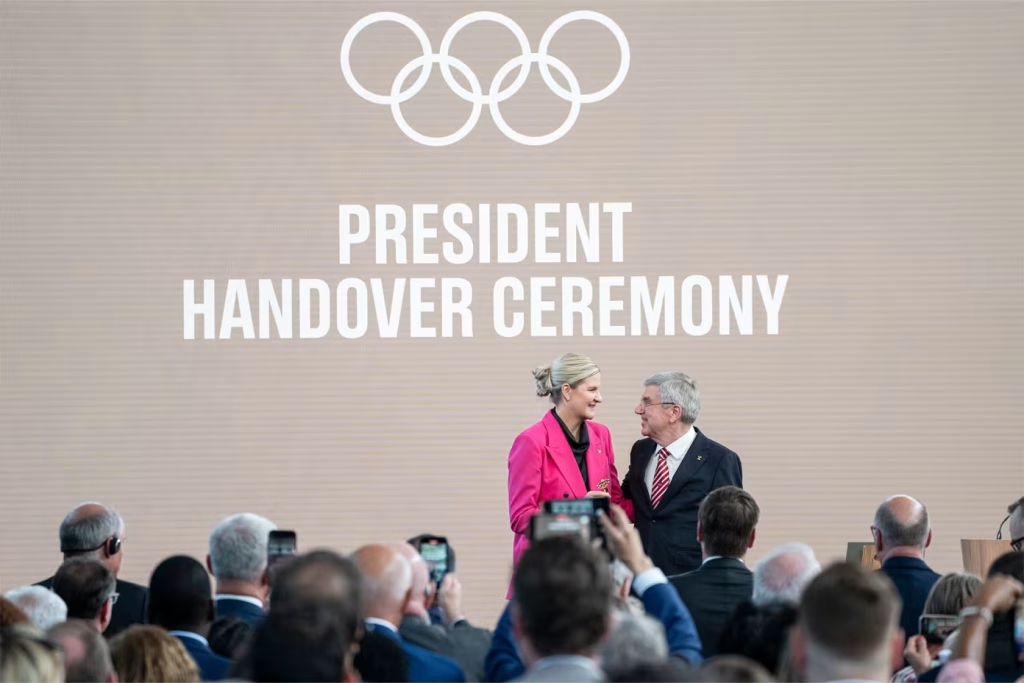At the invitation of the International Olympic Committee (IOC), the leading representatives of the Olympic Movement met today for the 13th Olympic Summit, which was held at Olympic House in Lausanne, Switzerland.
Chaired by the IOC President, the Olympic Summit forms part of the ongoing dialogue and consultation on subjects of significance for the future of the Olympic Movement. With a view to the upcoming presidential election, the IOC President invited all seven candidates to join the Summit.

Olympic Games
Paris 2024
1. The Summit participants welcomed the global success of the Olympic Games Paris 2024 for the entire Olympic Movement. They agreed that the Games were able to act as a much-needed symbol of peace, with athletes from the territories of all 206 National Olympic Committees (NOCs) and the IOC Refugee Olympic Team competing peacefully together, whilst at the same living together in the Olympic Village. This was only possible because the IOC fully exercised its autonomy and political neutrality.
This is confirmed by independent polling, which found that 78 per cent of those surveyed said they believe the Olympic Games are more important than ever in a divided world. Three out of four people also believe that the IOC was successful in “bringing the world together in peaceful competition” and in “building a better world through sport”.
Overall, 85 per cent of spectators rated their experience as “excellent” or “good” for the ticketed events, with 95 per cent doing so for the free events.
2. All participants noted that the Olympic Games Paris 2024 were the first edition of the Games to be organised and held under the Olympic Agenda 2020 reforms. As a result, the Games were more youthful, more urban, more inclusive and more sustainable.
3. The participants highlighted that the Olympic Games Paris 2024 were the first Olympic Games in history with full gender parity on the field of play, thanks to the distribution of an equal number of quota places to female and male athletes by the IOC. This key achievement was made possible due to a large number of initiatives led by the IOC and delivered in partnership with the Olympic Summer International Federations (IFs), and other stakeholders, such as the NOCs and the Paris 2024 Organising Committee.
4. The participants also welcomed the huge success of the IOC Refugee Olympic Team at the Olympic Games Paris 2024. The IOC Refugee Olympic Team, made up of a record number of 37 athletes, hosted by 15 NOCs and competing across 12 Olympic sports, demonstrated to the world that refugees are an enrichment to society. The participants took note, with great satisfaction, that the team won its first Olympic medal.
5. All participants welcomed the research showing record audiences for the Games. Eighty-four per cent of the total potential global audience, which is equal to around five billion people, followed the Olympic Games Paris 2024, according to independent research.
Digital platforms drove an unprecedented level of attention. There were an estimated 412 billion engagements from 270 million posts on social media platforms globally. This represents a four-fold increase compared to the previous edition of the Olympic Games. During the Games, the Olympic athletes, International Federations, NOCs and Organising Committees were able to add 85 million extra followers to their main social media handles. The Summit welcomed the fact that the research also found that the “Generation Z” demographic is now engaging more with the Olympic Games than any other segment of the population.
Some 95 per cent of athletes surveyed rated their overall experience positively, with 91 per cent citing “competing at the biggest multi-sport event on earth” and 89 per cent rating “becoming an Olympian” as fundamental motivations for participating at the Olympic Games Paris 2024.
6. The Summit participants agreed that the Olympic Games Paris 2024, following the reforms of Olympic Agenda 2020, met the expectations of the world. These were truly Olympic Games of a new era. People were longing for something that gives them hope, brings them joy, makes them proud and brings us all together. The Games clearly met these expectations.
7. The Summit participants heard the President of the International Paralympic Committee (IPC), Andrew Parsons, describe the Paralympic Games as “the most spectacular Paralympic Games ever in terms of sport performance, venues, atmosphere and reach”. These were the first Paralympic Games to fully benefit from the cooperation agreement signed with the IOC in 2018. This “new era of collaboration”, as President Parsons called it, allowed for collaboration from the election of the host city to the organisation and staging of the Games. This strongly supported the IPC’s aim of an “inclusion revolution”, and positioned the Paralympic Movement as a strong partner of the Olympic Movement.
8. The Summit participants expressed their gratitude to the Paris 2024 Organising Committee, under the great leadership of Tony Estanguet, ably assisted by Étienne Thobois and their entire team, who added their creativity, sense of innovation, vision of French history and culture and great engagement with the French people.
Milano Cortina 2026
9. With just over one year to go until the Olympic Winter Games Milano Cortina 2026, the Summit acknowledged that venues are now rapidly gearing up, with many in the final stages of preparation. They noted that, as the winter season gets underway, test events will be taking place, many of which are in existing facilities that host international competition annually. The next critical milestone will be in March 2025, with the pre-homologation of the new sliding centre in Cortina.
Olympic Esports Games
10. The Summit welcomed the decision to launch Olympic Esports Games and the partnership with the NOC of Saudi Arabia to host the inaugural Olympic Esports Games in the Kingdom of Saudi Arabia on a date to be announced shortly. The Olympic Esports Games will feature electronic physical sports, simulation games and traditional esports titles in line with Olympic Agenda 2020+5.
11. The participants re-emphasised the need to fully respect the Olympic values for these Games.
12. It was emphasised that IFs already engaged in an e-version of their sport that is considered for inclusion in the Olympic Esports Games will be the IOC’s first “go-to” partners. The same will be true for NOCs that already include esports in their activities.
13. The IOC informed the Summit about the creation of a new dedicated structure within its organisation, clearly separate from the organisational and financial model for the Olympic Games. Such an approach will also be taken with regard to the financing of the Olympic Esports Games.
This new form of organisation will not consist of a traditional organising committee on one side and an IOC coordination commission on the other, but rather a joint committee. This is chaired by IOC Member Ser Miang Ng, with the Vice-Chair being the President of the Saudi NOC and Saudi Sports Minister, Prince Abdulaziz bin Turki Al-Saud.
Artificial Intelligence (AI)
14. Participants welcomed the successful launch of the Olympic AI Agenda. They underlined the importance of the IOC taking the lead to establish guiding principles, identify high-impact areas for AI application, and explore the framework and governance mechanisms needed to mitigate risk and promote the responsible use of AI.
15. The Summit reiterated the call by the Olympic Movement for the governments of the world, with the leadership of the United Nations, to create robust global AI regulations that protect human dignity and ensure equitable progress in this field.
16. The Summit noted that a coordinated approach across the Olympic Movement is essential to harness AI’s potential while preserving the integrity of sport. The participants acknowledged that the IOC’s leadership in developing comprehensive AI guidelines will help ensure consistent standards and practices across IFs, NOCs and other stakeholders. They recognised that this unified strategy would strengthen the Olympic Movement’s position in navigating technological advancement while upholding the Olympic values.
17. The Summit also highlighted the IOC’s proactive stance in establishing partnerships with leading technology providers and academic institutions to develop AI solutions that address specific needs within the Olympic Movement. This collaborative approach demonstrates the IOC’s commitment to fostering innovation while maintaining careful oversight of AI implementation across all aspects of sport, from competition management to athlete development and fan engagement.
Protection of Athletes
World Anti-Doping Agency (WADA)
18. The Olympic Summit welcomed the update provided by the WADA President. He reported that:
- The recommendations adopted by the WADA Executive Committee following the Cottier Report and the World Aquatics Audit Report will be widely implemented as part of the World Anti-Doping Code and International Standard update process that is currently underway with all stakeholders worldwide.
- For the good of all the athletes around the world, it is of vital importance to move forward in collaboration.
- The 2027 Code review process will bring increased focus on the accountability of the entourage as per the recommendations of the sports movement.
19. The Summit participants welcomed the continued progress of WADA’s Intelligence and Investigations Department. President Bańka highlighted the 85 joint operations conducted by European National Anti-Doping Agencies (NADOs) and law enforcement agencies. It was noted that this has so far helped to remove an estimated 450 million doses of potentially dangerous drugs from circulation, and will help reduce the prevalence of doping.
20. The Summit took note with concern of the lack of delivery on funding commitments by certain governments for WADA. The fulfilment of these commitments is in the vital interest of a continued and harmonised global anti-doping effort.
21. The Summit supported the candidacy of Witold Bańka and Yang Yang as WADA President and Vice-President, underlining their important achievements over the last six years, including the implementation of the governance reforms and the commitment to the implementation of the recommendations of the Cottier Report.
International Testing Agency (ITA)
22. The Summit welcomed the update from the Chair of the ITA Board on the Olympic Games Paris 2024 pre-Games and Games-time programmes. In particular, the work of the ITA Pre-Games Expert Group, which included the NADOs of China, Germany and the United States of America, and which was supervised by a panel composed of athletes’ representatives, contributed to reducing testing gaps ahead of the Games.
23. The Summit welcomed the ITA’s finding that 90 per cent of the Olympic participants at the Olympic Games Paris 2024 were tested at least once in the six months prior to the event, meaning more than 31,000 tests.
Safe Sport
24. The participants welcomed the setting up of the Safe Sport Regional Hub Initiative by the IOC, with two pilot projects already operating in Southern Africa and the Pacific Islands. Groundwork has also been laid for a European Hub. This new model for athlete safeguarding represents a bottom-up approach, which emphasises the need to address this highly sensitive and highly complex social issue at the local level.
25. Participants also noted the success of the IOC Safeguarding Officer in Sport Certificate, which to date has 393 graduates/students from 99 countries.
26. Innovation by the IOC was also welcomed by the Summit. It was noted that, at the Olympic Games Paris 2024, the IOC rolled out the largest ever AI-powered solution to combat online violence towards athletes and officials. During the Paris Games, the online abuse protection service analysed 2.4 million posts and comments from the 20,000 athletes’ and officials’ social media handles, in real time and in over 35 languages, flagging over 152,000 posts and comments as being potentially abusive via AI.
27. The Olympic Summit participants welcomed the Mentally Fit Helpline for Olympians and Paralympians at the Olympic and Paralympic Games Paris 2024, which will remain open for four years and is available 24 hours a day in over 70 languages.
Economic Outlook
28. The Summit noted, with great satisfaction, the very positive financial outlook for the IOC and thus for the entire Olympic Movement. The revenues for the 2021-24 period will be USD 7.6 billion. Of this, the IOC is on track to distribute USD 6.8 billion, which corresponds to USD 4.7 million per day to the Olympic Movement. This is an increase of 12 per cent compared to the previous quadrennial period and a 45 per cent increase since 2013.
29. The prospects for the 2025-28 period are for further growth of these revenues. This is based on: the fact that USD 7.3 billion has already been secured for this new quadrennial period; the forthcoming agreements on still-to-be-concluded media rights in some regions; the renewed interest in the TOP programme; and the new revenue generation opportunities opened up by the Olympic AI Agenda and the Olympic Esports Games.
USD 6.2 billion in revenue has even already been secured for the 2029-32 period. This brings the already secured revenues of the IOC to USD 13.5 billion.
30. The participants welcomed this as evidence that the Olympic brand is stronger than ever.
LIST OF PARTICIPANTS
IOC President
Thomas BACH (Chair)
IOC Vice-Presidents
Nicole HOEVERTSZ
Nawal EL MOUTAWAKEL
Gerardo WERTHEIN (excused)
Executive Board Members
Emma TERHO, Chair of the IOC Athletes’ Commission
Nenad LALOVIC, President of an Olympic Summer Sports Federation
International Federations
Gianni INFANTINO, President of the International Federation of Association Football (FIFA)
Luc TARDIF, President of the International Ice Hockey Federation (IIHF)
Jae-youl KIM, President of the International Skating Union (ISU) (excused)
Husain AL-MUSALLAM, President of World Aquatics
National Olympic Committees
GAO Zhidan, President of the Chinese Olympic Committee
Gene SYKES, President of the United States Olympic and Paralympic Committee (USOPC)
Recognised Organisations
Ivo FERRIANI, President of the Winter Olympic Federations (WOF)
Robin MITCHELL, President of the Association of National Olympic Committees (ANOC)
Francesco RICCI BITTI, President of the Association of Summer Olympic International Federations (ASOIF)
Ingmar DE VOS, President-elect of ASOIF (excused)
Andrew PARSONS, President of the International Paralympic Committee (IPC)
Continental Associations of National Olympic Committees
Mustapha BERRAF, President of the Association of National Olympic Committees of Africa (ANOCA)
Spyros CAPRALOS, President of the European Olympic Committees (EOC)
Randhir SINGH, President of the Olympic Council of Asia (OCA) (excused)
Neven ILIC, President of Panam Sports
Guests
Pierre-Oliver BECKERS, Chair of the IOC Coordination Commission for Paris 2024
Kristin KLOSTER, Chair of the IOC Coordination Commission for Milano Cortina 2026 (excused)
Ser Miang NG, Chair of the Joint Committee for the Olympic Esports Games
Witold BAŃKA, President of the World Anti-Doping Agency (WADA)
Valérie FOURNEYRON, Chair of the International Testing Agency (ITA) Board
Candidates for the IOC presidency (listed in order determined by a drawing of lots)
HRH Prince Feisal AL HUSSEIN, IOC Executive Board member
David LAPPARTIENT, Chair of the IOC Esports Commission
Johan ELIASCH, President of the International Ski and Snowboard Federation (FIS)
Juan Antonio SAMARANCH, IOC Vice-President
Kirsty COVENTRY, IOC Executive Board member
Lord Sebastian COE, President of World Athletics
Morinari WATANABE, President of the International Gymnastics Federation (FIG)
Source: https://olympics.com/ioc/news/communique-of-the-13th-olympic-summit




